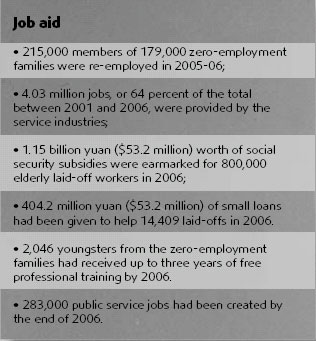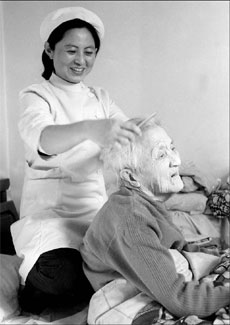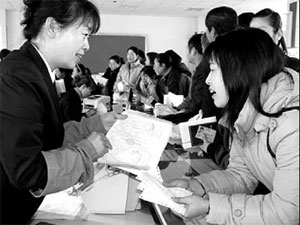From zero to heroes
Wang Ying has a warrior's heart. When she gets knocked down, she gets up quickly, dusts herself off, and tries again. In 1998, after Wang was laid off from a State-owned chemical plant, she tried processing clothing accessories and later sold insurance. Nothing seemed to work out and a heartbreaking divorce added salt to the wounds.
"My favorite song is Let's Start Anew," Wang said from her office at Daxidi Fur & Leather Products Co in Anshan, a central city of Liaoning Province. "I've always wanted to get up after I had fallen."
|
Care in the community: A laid-off worker finds a new career helping the elderly at Xishan Street, in the city of Fuxin in Liaoning. |
Today she runs a fur and leather apparel factory and employs more than 40 workers. Better still, her business is making a profit. But her success was not achieved by just her never-say-die attitude alone.
Wang is one of thousands of Liaoning locals whose lives have been transformed by an innovative government program, which has worked wonders in the northeastern province.
When the program was launched in 2005, the single mother-of-one-son was among the 143,000 families, which had no family members working. They were dubbed the "zero-employment families".
Given the employment nature of this famous industrial base, the large number of such families was no surprise. It was common for fathers and sons, as well as married couples, to work together at one of the coal factories or iron plants. So when businesses went bankrupt, whole families would be affected. The province greatly suffered the pains of China's transformation into market economy.
About 500 inefficient State-owned businesses collapsed between 1990 and 2000 and at least 1.78 million State workers were laid off between July 2001 and 2004. At one time, Anshan's unemployment rate soared to 15 per cent, according to the municipal Party chief Zhang Jiehui.
Families without a single wage earner were the most vulnerable. Most of the unemployed were well above 40, had limited skills and had poor health, and found it hard to compete for jobs. But these workers had helped forge the name of Liaoning as an industrial cradle for the past few decades. Their efforts were historic.
Workers at State firms in Fushun, in eastern Liaoning, had produced China's first barrel of oil, the first tonne of aluminum, and rolled out the Republic's first excavating machine.
Their past efforts must not be forgotten. "Employment, only employment, could furnish stable sources of subsistence for the poor families," Li Keqiang, secretary of the Liaoning Provincial Committee of the Communist Party of China, said when he visited the zero-employment families in Benxi in early 2005.
 "There should be at least one person employed for every urban family in need of work. "
"There should be at least one person employed for every urban family in need of work. "
Liaoning was the first province in China to promise that members of the zero-employment families would receive a job within 20 days after registering at job centers.
A huge workfare program was developed to buy or create public-service jobs in communities inhabited by the "zero-employment families".
Before she was offered a job in January last year, Lin Wen had done temporary chores in Anshan. Both she and her husband were dropped from the Anshan No.1 Department Store Co in 2003, and the modest allowances force them to live under extreme strain and stress. "Thanks to the re-employment aid program, I signed a contract with the Bagua Neighborhood management of the Tiedong District and won a job taking care of green patches in my community," the 39-year old said. "It's easier for me to take care of my young daughter."
Her husband works delivering bottled milk door to door.
Provincial and municipal government departments restructured their logistic services, so more jobs - some previously occupied by the retirees of these organizations - could be made available to those of the zero-employment families.
Private businesses were offered tax incentives to recruit members of the jobless families.
By the end of last year, every jobless household had at least one member working again.
To help the re-employed secure more stable and higher paying jobs, free training courses were offered. Poorer people who attended these courses were given free lunches as well as commuting subsidies.
|
Xie Shujuan (left), a worker with the Employment and Social Security Service Center in the city of Chaoyang, Liaoning Province, provides job-seekers with re-employment information in this file photo. Qiu Yijun |
"Warrior" Wang Ying attended a Start Your Own Business program run by the local labor department and at the end of 2003, was given a 10,000 yuan ($1,316) loan, which helped to make her business dream a reality. She then moved to the city's re-employment incubation center.
"We conducted intensive market research, and believe there is a niche market for fur and leather products," Wang said. "Besides, getting into the incubation base means taxation exemption and other policy benefits."
Wang's firm makes goods for retailers in Shenyang, capital of Liaoning, and Beijing.
"I have opened a store in Anshan, and my plan is to open more in and beyond the city," she said. "Jobs at these establishments will open first to members of the zero-employment families ...I hope my chain store will become another incubator to hatch better work."
(China Daily 06/28/2007 page27)
















